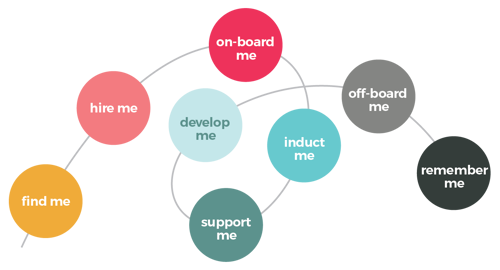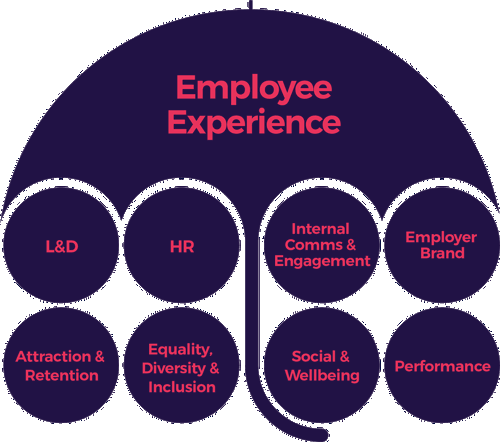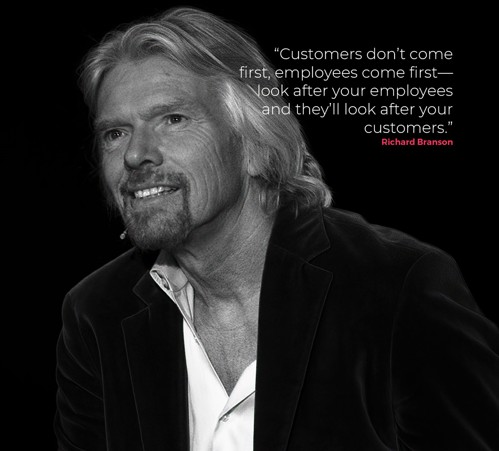Definition of Employee Experience
We have two definitions of Employee Experience (EX) – a short and a long version.
Short version:
“The entire relationship between employee and employer. It encompasses every interaction and touchpoint at every stage of the Employee Lifecycle.”

Long version:
“The entire relationship between employee and employer, including: how the employer treats their employees, how the relationship evolves, the work environment, the culture both parties operate in, and the tools provided to get the job done. It encompasses every interaction and touchpoint with the organisation and its stakeholders at every stage of the Employee Lifecycle.”
To give other examples of EX definitions:
- Deloitte defines EX as: "A holistic view of life at work, requiring constant feedback, action and monitoring."
- Culture Amp defines EX as: "Employee experience encapsulates what people encounter and observe over the course of their tenure at an organization."
- SAP defines EX as: "Employee experience is everything an employee encounters at a company – from their initial job search to their last day of work and beyond."
In short, it’s how you treat your employees. So, it’s the relationships and how these are handled; the work environment and if this is conducive to productive work; the culture; and the technology and tools to enable people to do their job well. Employee Engagement, morale, and productivity are all outcomes of a good EX.
If people have a good or great EX, it stands to reason that they’ll be happy or very happy at work. Clap-happy as this sounds, usually happy hands are busy hands! We agree with the sentiments from the wethrive Future of Employee Engagement Report 2019:
‘It makes perfect sense that if you work with a good group of people who have the same aims, have the resources you need to work well, feel competent in your job, and are acknowledged for the work you do, you will be much more likely to go in to work with a smile and work enthusiastically than if the conditions and culture make working life unpleasant.’
Where does Employee Experience sit within an organisation?
We see EX as the umbrella term for all people-related activity within an organisation.

At present, most EX activity is led by HR. At present, much of it is as an add-on to someone’s ‘regular’ duties. HR has been at the top of the people tree for generations. But given the appalling engagement statistics across the globe, it’s fair to ask if HR professionals have the right skillset to lead EX. Look at your own HR people—are they more about people or policing? If the latter, they’re unlikely to succeed with designing an effective EX. And given the disparity in funding and profile between EX and CX, HR has clearly failed to make the case for EX up until this point.
As EX is about putting people at the heart of an organisation, only ‘people-people’ should be given responsibility for it. These people could come from HR (as we know that many great HR people exist), Internal Communications, L&D or even Customer Service (especially as many of the EX principles come from CX).
We predict that, over time, the hierarchy of people functions will change, with EX as the umbrella and HR sitting alongside the likes of L&D and Internal Communications.
The person with the seat at the top table will be an EX professional with a background in improving people productivity. After all, as we keep saying, it’s about the people, stupid!
The rise of the Chief Experience Officer
What could be more important for a CEO to focus on than the brand and how the brand treats its key stakeholders such as customers, employees, and shareholders? We believe the CEO should be responsible for the brand—but before he/she is they need to understand the need for parity between EX and CX.
Let the finance team manage the numbers, let sales be responsible for revenue. If the CEO focuses on optimising the experiences that are delivered to all stakeholders, then this can only create incremental improvements in the performance.
Should, then, the title of Chief Executive Officer change to Chief Experience Officer? Is that not more reflective of what the role entails in a modern business environment?
Let’s face it, many products are very similar, it’s the experience that makes the difference. As the famous Maya Angelou quote goes:
“I’ve learned that people will forget what you said, people will forget what you did, but people will never forget how you made them feel.”
Why you should appoint an Employee Experience lead
We recognise that it will take some time before CEOs come around to the idea of becoming the Chief Experience Officer. So, in the short term, we strongly suggest organisations appoint an EX lead. After all, other departments have them. Somebody needs to be accountable, and to report on EX activity to the boardroom—just like a CX lead does.
Reasons why an EX lead is required includes:
- To improve organisational performance, and to report on this
- To drum up support and help employees see the benefits of EX
- To move EX from being purely tactical to being strategic
- To understand employee’s needs and to deliver against them
- To prioritise EX activity
- To allocate resources accordingly
- To represent employees in the boardroom
Look after your employees and they'll look after your customers
One of the most popular quotes on LinkedIn belongs to Richard Branson:

Most organisations talk about how important their people are; but whereas they spend millions on CX, they only invest the bare minimum in EX. With employee engagement rates as low as 20% across the UK, perhaps it’s felt that talk is cheap in relation to caring about employees.
Denise Lee Yohn, author of Fusion: How Integrating Brand and Culture Powers the World's Greatest Companies, says that to be successful, people-related activities should shift from being, "...side-tasks to be delegated to Marketing and HR to fundamental business priorities that deserve your attention and care."
The evidence-base
Organisations invested in EX are:
- Included 11.5 times more in Glassdoor’s Best Places to Work
- 4.4 times as often in LinkedIn’s North America’s Most In-Demand Employers
- Listed 28 times more often in Fast Company’s Most Innovative Companies
- Listed 2 times more often in American Customer Satisfaction Index
This shift will reflect the ever-increasing evidence that EX and CX are two equal sides of the same coin. After all, EX+CX=BX.
How Employee Experience impacts other business areas
EX has all kinds of links, correlations and impacts. Below, we briefly explore important considerations.
How does the Employee Experience impact the Customer Experience?
As we have outlined, EX and CX should be considered as two equal sides of the same coin. Which is why, back in 2019, we created the Employee Experience Opportunity (EXO), to encourage parity between EX and CX. We know there's a long road ahead before senior leaders understand this, and so we’ve set out to explain why they should. The evidence all points towards that happy, motivated employees will provide a better service to customers.
What’s the difference between Employee Experience and Employee Engagement?
Employee Experience is the sum of all interactions an employee has with their employer and the workplace environment. Employee Engagement refers to the level of commitment and involvement that an employee has towards their job and the organisation. Employee Engagement is an outcome of Employee Experience. You can read more about this here.
What is an Employee Experience survey?
An Employee Experience survey will aid you in understanding how your employees are feeling about working life at your organisation. If done effectively, it can help to prioritise the important issues. There are three main types of EX surveys: eNPS, Pulse and Full/Annual. You can read more about this here.
What are ‘Loud Quitting’ and ‘Quiet Quitting’?
Loud Quitting is an emerging trend in which employees openly and publicly express their dissatisfaction with their jobs and their intentions to leave the company, in contrast to the traditional Quiet Quitting, in which employees exhale only the bare essentials during working hours and leave their jobs without directly expressing their frustrations. You can read more about this here.
Why do Employee Experience initiatives fall short?
There's a wealth of evidence to suggest that whereas employees think EX is vital to organisational success, senior leaders are not investing time, resources and budgets to create better experiences. Why? As with everything, there's seldom one single reason and you can read more about these here.
What Employee Experience jobs are available?
EX professionals strive to enable employees to have even more good days at work. They will focus upon improving the culture and driving productivity. Roles range from Employee Experience Assistant to Employee Experience Manager to Chief People Officer. You can read more about this here.
What Employee Experience courses are available?
If you’re unsure what EX entails, how to build the business case for it, how to get started with your EX efforts, or what tools are on offer to create good-to-great experiences, then we currently offer three courses to support you:
- Introduction to Employee Experience Masterclass
- The EX Toolkit: Your go-to place to create great Employee Experiences
- The Employee Lifecycle: Creating Moments That Matter
You can read more about these courses here.
If you'd like to learn more about how to leverage your EX to achieve gains in engagement, productivity, and ultimately profit, then do get in touch.
You can read more on the Employee Experience here.


